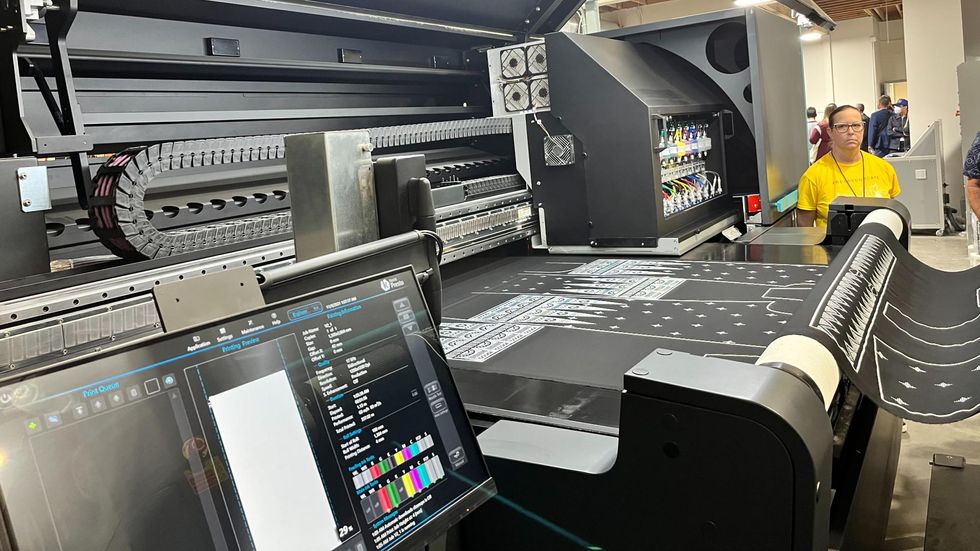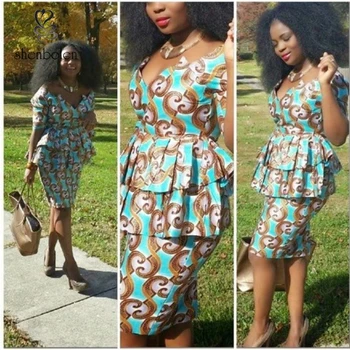The scene at ExchangeLA looked like a typical fashion show. Models sashayed across the stage in vibrant and flowy garments on Wednesday. A crowd cheered and snapped photos on their phones.
But the Kornit Fashion Week event wasn’t a typical fashion show: Every article of clothing on display was created using digital printing technology.
The show was part of a week-long eco-minded event hosted in L.A’s fashion district by Kornit Digital, an Israel-based global digital printing company. More of a mash-up than traditional fashion weeks, Kornit featured catwalks alongside panel discussions, presentations by industry experts and live demos of sustainability tech.
“Sustainability is the key factor that we are driving. As you all know, this industry is the second most polluting industry,” said Kornit CEO Ronen Samuel. “Leveraging Kornit technology, you can do it fully sustainable, fully green without any waste of water.”
The fashion world has long been scrutinized for its wasteful practices. The sector accounts for around 10% of global greenhouse gas emissions, according to a United Nations analysis, and the rise of fast fashion has only exacerbated the problem.
That’s not to say the industry isn’t working to reduce the environmental footprint of its products: Kornit, for example, prints on garments using their patented NeoPigment inks, certified and free of heavy metals, formaldehyde, and Alkylphenol Ethoxylates (APE), making them non-hazardous, non-toxic, and eco-friendly; and brands like H&M are moving away from their fast fashion roots with their “conscious” collection, using materials like organic cotton and recycled polyester. But critics say that change isn’t happening fast enough.
“Everyone has to be on the table for this to work out as an ecosystem,” said Marci Zaroff, CEO of ECOfashion during the conference. “Sustainability must be embedded into our supply chains, our products and our brands.”
The question, according to USC environmental engineering professor David Gerber, is whether Kornit’s technologies can have a noticeable impact on overall emissions levels.
There are three factors to weigh when considering carbon output, Gerber said: direct emissions, indirect emissions from electricity purchased and used, and indirect emissions not controlled by the company (such as shipping routes).
While many companies can control for direct emissions and indirect emissions from electricity, it’s that third category—emissions not controlled by the company—that presents a real challenge.

Photo by Decerry Donato
“Understanding of stage three is really a challenge because you have to know where every single molecule of material or energy came from,” Gerber said. “You might be using sustainable cotton, then you might be using the most sustainable inks, and you might be using the most sustainable machine which has no waste. But as soon as you start moving those T-shirts around, are you using the most sustainable supply chain?”
Still, the folks at Kornit would say that their tech is at least a step in the right direction.
After the fashion show concluded, Kornit offered a tour through the City of Industry-based facility—owned by green-minded production manufacturing company DenimFWD—where it houses its products. The focus was on its two crown jewels: the Presto MAX printer, built to handle rolls of fabric; and the Atlas MAX, which prints up to 150 shirts per hour. Both are designed to eliminate redundancies, wasted time and excess labor.
The printers provide Kornit with the firepower to produce quickly, and reduce the risk of having excess inventory that can contribute to waste—an important feat, given that the Environmental Protection Agency estimates Americans generate 16 million tons of textile waste each year.
“From the beginning, [sustainability] is designed into the process,” said Carlos Arias, CEO of DenimFWD. “Everything we’re doing is supported by state of the art technology that achieves that.”
From Your Site Articles
Related Articles Around the Web





More Stories
Brick and Mortar Retail Stores Vs Online Gifts Shopping – Choose Wisely
Ten Book Options to Use For Business Gifts
The Five Best Places to Look to Keep Up With Trending Fashion